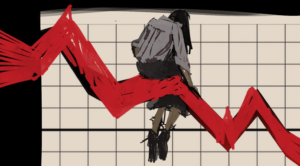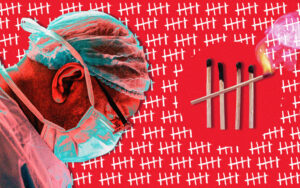For those who wonder what the Hoya state of mind is come second-semester senior year, one fun fact is that a cheery email from the Office of Advancement’s “Class of 2017 Fund” comes around every two weeks to nag me about making a “gift” to Georgetown.
Last week, they declared the start of a “HOYAlympics”: a race to see who could throw money at our school the fastest. The business school was leading the way in “gold” standing with more than half its class participating. The Class of 2017 Fund had a “Breakfast of Champions” in Red Square, ostensibly awarding the bravado of those who parted with their money with Dunkin Donuts. The “HOYAlympics” is just one of a long series of campaigns and rewards. Free beers, wines, Tombs pitchers, shamrock shakes, green bagels, Chick-fil-A, Georgetown Cupcakes, and Saxby’s coffee are just a taste of the items they have confronted me with to do the right thing. They mailed me a physical letter all the way to Hong Kong containing my classmates’ sincere pleas to donate. A few days ago, someone from the Fund even sent me a message on Facebook, filled with teary emojis about how participation from the SFS was “dead last.”
As the Office of Advancement obsessively repeats, “every gift makes a difference.” But perhaps they fail to see the irony that the time and resources spent on marketing the “Class of 2017 Fund” could be better used to actually benefit a student or group on campus. Or the even greater irony that they are asking people who have already committed to pay Georgetown $300,000 over the last four years to pay more. How can we fund our school if we can’t even fund ourselves?
Suffice to say, money is both a fact of life and a tool of social exclusion: the Senior Class Committee keeps telling me how awful it is to miss out on celebrating the remainder of the semester with everybody in the senior class. Just as how everybody carefully hides their grades when professors return midterms and papers, talking about money is uncomfortable. Money determines what you eat, where you go, who you bring, and how you have fun. In college, an intensely social environment where you’re supposed to find your niche, the last thing anyone wants to do is to highlight their differences with metaphorical dollar signs.
Fortunately, the university is a giant bureaucratic machine that redistributes the income it receives to benefit a financially stratified student body. The SFS, for example, provides grants for students to pursue public service projects in foreign countries. I know a handful of MSB friends who gained fun consulting experiences in Barcelona and Argentina. The Office of Global Services dishes out money for cultural clubs to serve food on Copley Lawn. Our librarians buy the books we need to write our theses. Most importantly, the Student Activities Fee makes all sorts of experiences possible that inject Hilltop life with a certain vibrancy that other urban campuses don’t have, whether that be meeting friends after mass at Dahlgren Chapel at a Campus Ministry hospitality night, playing with rabbits and toy horses the Georgetown Program Board, or sitting in a sweaty office putting together a school newspaper on a Wednesday night.
Thus, it is painful to see the sparse attention this school gives to investing in academic and extracurricular opportunities for its students. For example, many detractors of our former men’s basketball coach made comparisons between his salary and the library’s budget cuts. But perhaps the most damning case is that our Student Activities Fee is overseen by GUSA’s Finance and Appropriations Committee, an opaque group of students who appointed themselves to allocate a million dollars of our money. The GUSA Senate’s meeting minutes are mostly silent about how to come to decisions about our Student Activities Fee money.
Consider GUSA’s latest budget report, which details how they allocated the Student Activities Fee for the 2018 fiscal year while condescendingly attacking the Georgetown Program Board for their apparent “fiscal irresponsibility.” GUSA decided to halve the money it gives to the Media Board, the group that funds the Voice, The Hoya, WGTB, and others, because, it wanted to rein in “costs associated with print and subscriptions.” But printing words on paper is not the only value campus media provides. These publications allow students to do in-depth research, sit in press conferences with mainstream journalists, learn graphic design and web skills, and much, much more. The Student Activities Fee is supposed to help us pay for the Photoshop software and computers we need to put together the paper, and for the trips to Madison Square Garden to cover the men’s basketball beat. When we expect students to pay out of pocket for any of these things, we exclude them from the little moments that we have come to treasure as a part of life at Georgetown.
I propose some solutions to transform our tragic relationship with money. Although GUSA’s referendum to replace the Senate failed, it is worthwhile to revisit how we redistribute the Student Activities Fee. The current process has zero democratic legitimacy—no one knows who his/her GUSA Senator is, even if they’re ostensibly “elected.”
Next, the rest of GUSA needs to stop being a perpetual unpaid internship under Todd Olson’s Division of Student Affairs and start acting like a student union that works in everybody’s interest. Instead of bickering about policy committees that only serve to dazzle someone’s resume, why not utilize the combined buying power of 7,000+ millennial consumers who contribute millions of dollars to Washington, D.C.’s regional economy every year to lower the cost of living the life of a Georgetown student? Negotiating with the Washington Metropolitan Area Transit Authority for discounted train and bus fares to alleviate the financial burdens of an unpaid internship downtown would be a start.
Finally, the Senior Class Committee should consider partnering with the Office of Student Financial Services to teach every graduate basic financial literacy. Who cares about boring toga parties and keggers on Leavey Esplanade on a rainy day? For those born without silver spoons in their mouths, a few lectures on how to apply for credit cards, purchase health insurance, budget your life while dealing with student loans and entry-level salaries, file your taxes, start saving to make a down payment for a house, or even deal with fraud and identity theft would help lift at least some of the daunting obligations a financially independent adult must fulfil.
After all, if we don’t learn how to save our money, how can we give back to our beloved alma mater?
Kenneth is a senior in the SFS.






